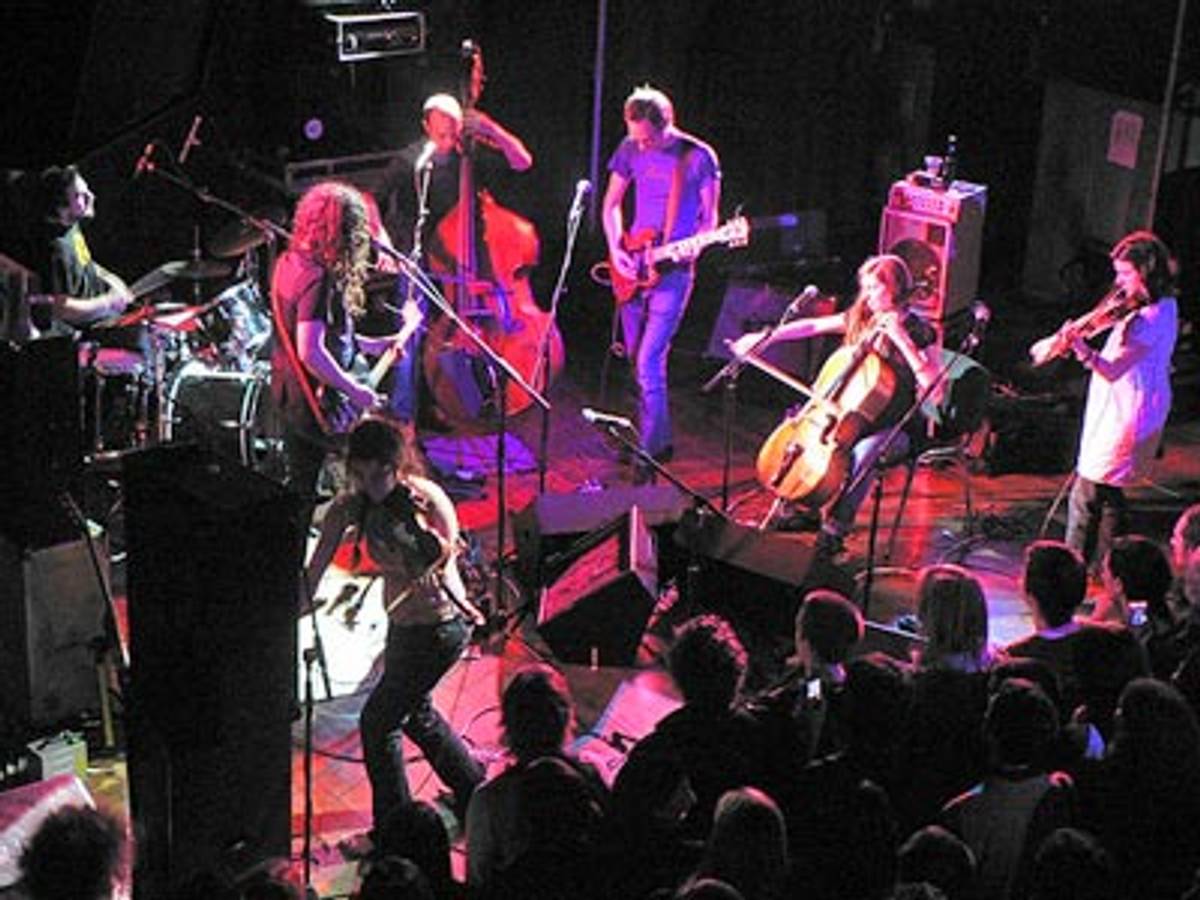In 1994, a trio of Montreal musicians formed the band Godspeed You! Black Emperor. Four years later, by the time of their first album, F#A# (Infinity) (Kranky/Constellation), they had become a nine-piece ensemble of strings, guitars, drums, bass, and more, with a symphonic and immense sound, alternately cacophonous and melodic, full of dynamics and drama. Their sound was often described as music for the world to end by, perhaps in part because of the religious motifs that run through their work, including tropes both Christian—recordings of evangelists appear on many of their albums—and Jewish. (Their second release, Slow Riot for the New Zero Kanada—the cover of which is embossed with the Hebrew term tohu va vohu, translated roughly as “chaos”—includes a grievous text from the book of Jeremiah, describing an earth laid waste, without light or life.) Their live shows were the stuff of myth, performed in near darkness, with films of birds, bombs, industrial sites, etc. projected behind them. Profiled or reviewed in publications ranging from fanzines to The New York Times, they packed every venue they played. Flooded with requests to use their music on movie and advertising soundtracks, the devoutly independent collective turned down Oliver Stone and Merrill Lynch and significant financial pay-offs (they said “yes” occasionally, as with Danny Boyle and his film 28 Days Later).
And then, in 2003, Godspeed went on a more-or-less permanent, unexplained hiatus. But during the band’s last throes, a core group of three Godspeed members—Efrim Menuck, Sophie Trudeau, and Thierry Amar—had begun recording and performing as Silver Mt. Zion (the name would go under a number of permutations: Thee Silver Mt Zion,

Thee Silver Mountain Elegies, Thee Silver Mt. Zion Memorial Orchestra and Tra-La-La Band). A five-to-seven-piece group (depending on the album or tour), with Menuck as lyricist and vocalist, SMZ recently issued their sixth release, 13 Blues for 13 Moons (Constellation). SMZ’s music is generally of a quieter strain than Godspeed’s (although 13 Moons finds them enthralled with the potentials of their amplifiers), with singing on almost every track. Their songs are idiosyncratic, structured to fit the mood of the music rather than on regular chord changes and melodies. The tempos are often slow, and the intricacy of the instruments speaks to a range of avant-garde influences, with occasional eastern European and Klezmer accents.
If Godspeed flirted with Jewish material, SMZ addresses it head-on, in both tone and subject. Fronted by Menuck, who is Jewish (and like the other members of both bands, cagey about his biography), the band draws themes and lyrics from Genesis and the Psalms, employs Hebrew, and frequently references angels and Babylon.
In “There’s a River In the Valley Made of Melting Snow,” for instance, from their fourth release, Pretty Little Lightning Paw (Constellation), the narrator looks out on a scene of devastation with shock and wonder, while seeking solace in another. Menuck sings,
Mystery and wonder did light up the valley
To be beat back by dark clouds…
Your hands like birds in the trees
If the trees themselves were all on fire
Your hips on mine make a choir
Singing “baruch atta adonaï.”
The song is typical of SMZ—the declarative language, long phrasing, and the apocalyptic (yet strangely pastoral) imagery—but it’s also pretty typical of the Psalms, in this case, Psalm 18:7, 11:
Then the earth shook and trembled; the foundations also of the hills moved and were shaken . . . He made darkness his secret place; his pavilion round about him were dark waters and thick clouds of sky
There’s a correspondence in spirit and tone—if not entirely in content—to SMZ’s dazed, awestruck visions.
At times, Menuck seems to be addressing Biblical material more directly, as in “God Bless Our Dead Marines,” from 2005’s Horses in the Sky (Constellation). Menuck recasts a passage from Genesis, in which Jacob dreams of angels moving up and down a ladder to heaven.
They put angels in the electric chair
Straight-up angels in the electric chair
And no-one knew or no-one cared
But burning stars lit up their hair
And burning stars lit up their hair
And crawled to heaven on golden stairs
In interviews, Menuck has talked about the universality and timelessness of this sort of material. In an April 2008 interview with Belgian radio, he was asked about the religious significance of SMZ’s name.

He responded: “Mt. Zion is a holy site for Jews, it’s a holy site for Christians, it’s in every other really good reggae song you ever hear. It’s like the mythical place you aspire to reach and you know you never will but you tell yourself stories about it when you’re feeling low. I don’t believe in God, but I believe in Mt. Zion. I like that humans have that quality, that they need to believe in this thing that’s not real, you know? But that it’s a good thing, it’s a pure thing, and a good thing and maybe some day we’ll make it there. I love that. That moves me to tears, that idea.”
He’s not alone. There’s a long tradition of musicians—religious or otherwise—charging their imagination with materials from the Scriptures. It’s present in the apocalyptic reveries of blues musicians like Gary Davis and Son House (both preachers), in the ascendant squall of John Coltrane and Albert Ayler, and in the entirety of Bob Dylan’s career. Godspeed and SMZ are another notch along that continuum, creating their lyrical and aural (and visual) lexicon from the same sources. And like their predecessors they—despite their Canadian origin—are operating within a particularly American folk vernacular, in terms of their compositions, a fact of which they’re well aware. The difference, perhaps, is the addition of what they see as a Jewish vernacular. “From the folk aspect,” one of the members said, in a 2004 group interview with the Web site Manchester Music, “it’s a real blend fusing Jewish sensibilities with American sensibilities.”
Silver Mt. Zion play the Music Hall of Williamsburg on May 19th and the Bowery Ballroom on May 20th.
Jonathan Dixon is a writer in Brooklyn.
Jonathan Dixon is a writer in Brooklyn